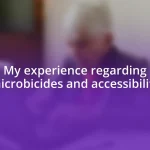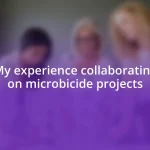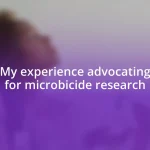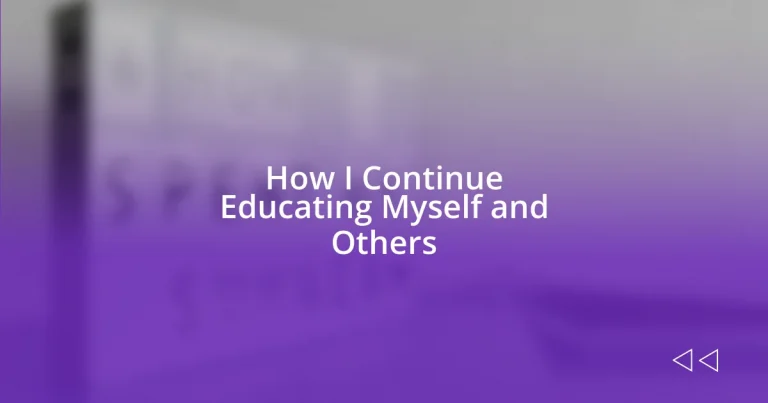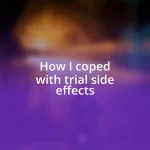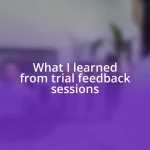Key takeaways:
- Education is a lifelong journey that fosters critical thinking, personal growth, and community connections, transcending mere job preparation.
- Setting specific and actionable education goals enhances motivation and makes learning more purposeful, while regular reassessment of these goals allows for continued growth.
- Engaging with educational communities and mentoring others enriches the learning experience, fostering collaboration and mutual growth between mentors and mentees.
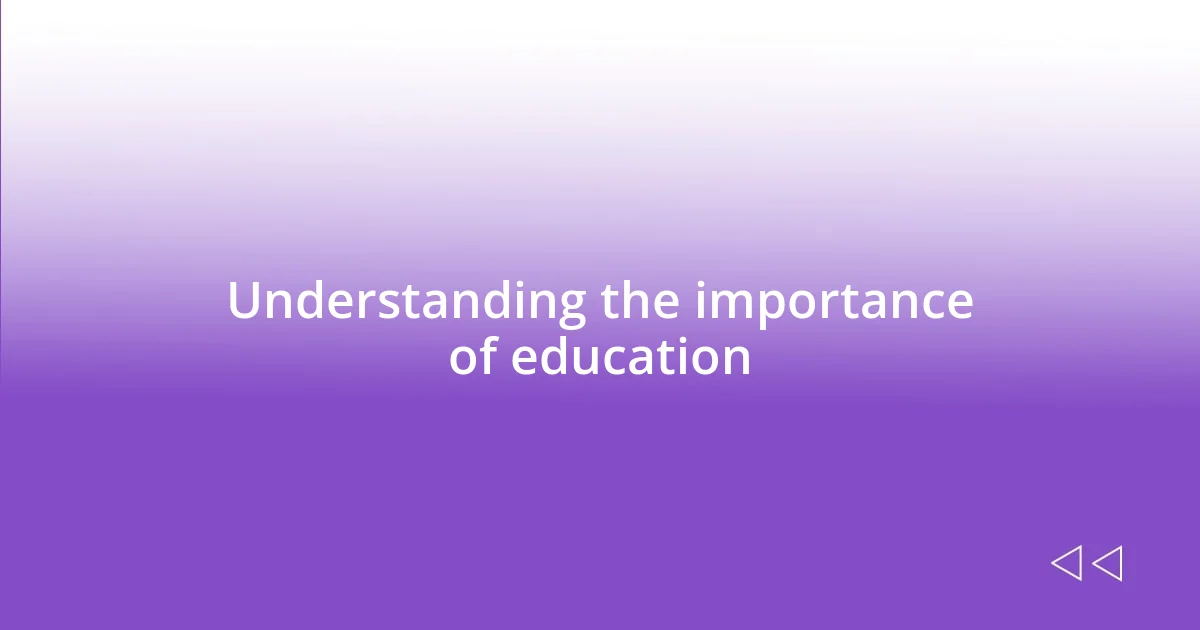
Understanding the importance of education
Education is more than just the acquisition of facts; it shapes our perspectives and influences our choices. I still remember a moment in college when a professor challenged our views on a delicate topic. That conversation sparked a deep reflection in me, opening my mind to opposing viewpoints and ultimately shifting my worldview. Isn’t it fascinating how a single discussion can ripple through our lives, enhancing our ability to navigate complex situations?
I often hear people say, “What’s the point of learning if it doesn’t lead to a job?” This perspective overlooks the broader value of education. To me, education is a lifelong journey that empowers us to think critically and question the status quo. I’ve found that nurturing curiosity through learning can enrich our lives far beyond career advancement, leading to personal growth and deeper connections with others. Don’t you think education can transform our interactions with those around us?
Reflecting on my ongoing education, I realize that sharing knowledge can be equally vital. The joy I feel when I help someone understand a challenging concept brings its own rewards. It reinforces the idea that learning isn’t a solitary pursuit; it’s a collaborative process where we uplift one another. Have you ever experienced that thrill of seeing someone “get it” thanks to your guidance? It’s an incredibly validating experience that highlights the communal aspect of education.
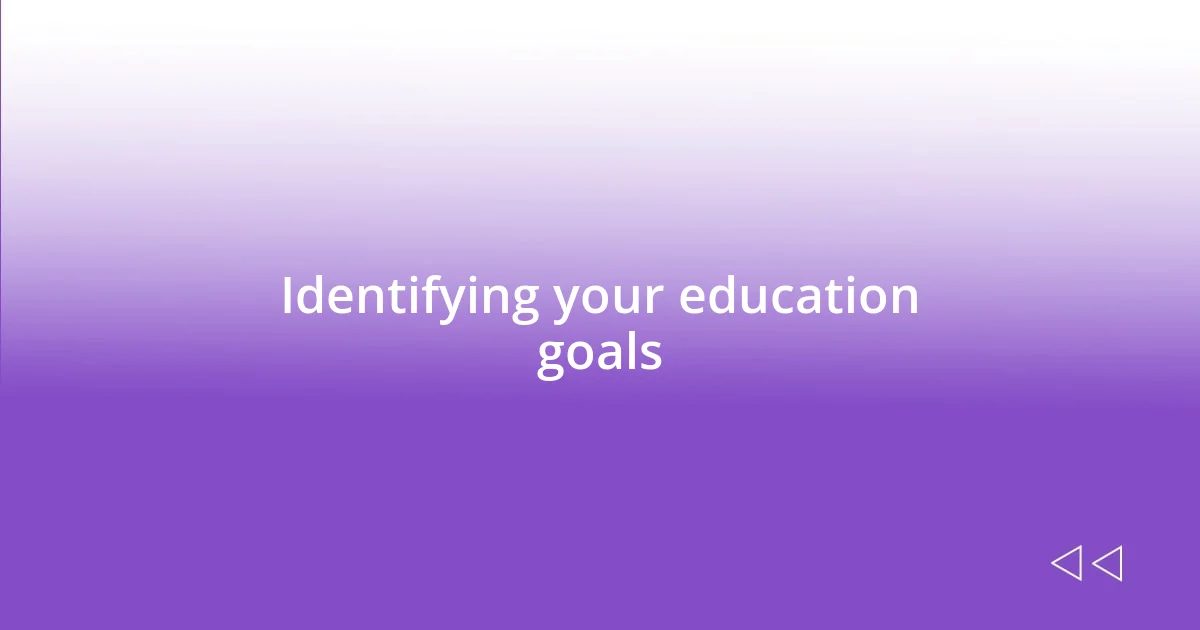
Identifying your education goals
Identifying your education goals is like charting a course before embarking on a journey. I clearly recall when I set a goal to master a new language. Initially, I had a vague desire to learn Spanish, but once I defined my goal—fluency within a year—I found my motivation soared. This clarity not only shaped my study habits but also influenced how I approached each lesson, making the entire experience more purposeful.
When I reflect on my friends and colleagues, many fall into the trap of generic goals. “I want to be better at my job” is common, but it lacks specificity. I often encourage them to break these broad ambitions into actionable steps. For instance, instead of just wanting to improve in their field, they could aim to complete a specific certification course or attend a certain number of workshops. This targeted approach has consistently proven invaluable for myself and those around me.
Moreover, I believe it’s crucial to revisit and adjust our education goals regularly. Just last year, I had my heart set on improving my public speaking skills. After a few months, I realized that focusing solely on that goal felt overwhelming. So, I pivoted my focus to joining a local Toastmasters group. This shift didn’t just help me become a better speaker—it opened up a community that turned my education journey into a shared experience. How often do we set and forget our objectives, missing out on the joy of learning with others?
| Generic Goals | Specific Goals |
|---|---|
| “I want to learn more.” | “I will take an online course in digital marketing this month.” |
| “I want to improve at work.” | “I will attend two professional development workshops this quarter.” |
| “I want to get fit.” | “I will run a 5k in three months.” |
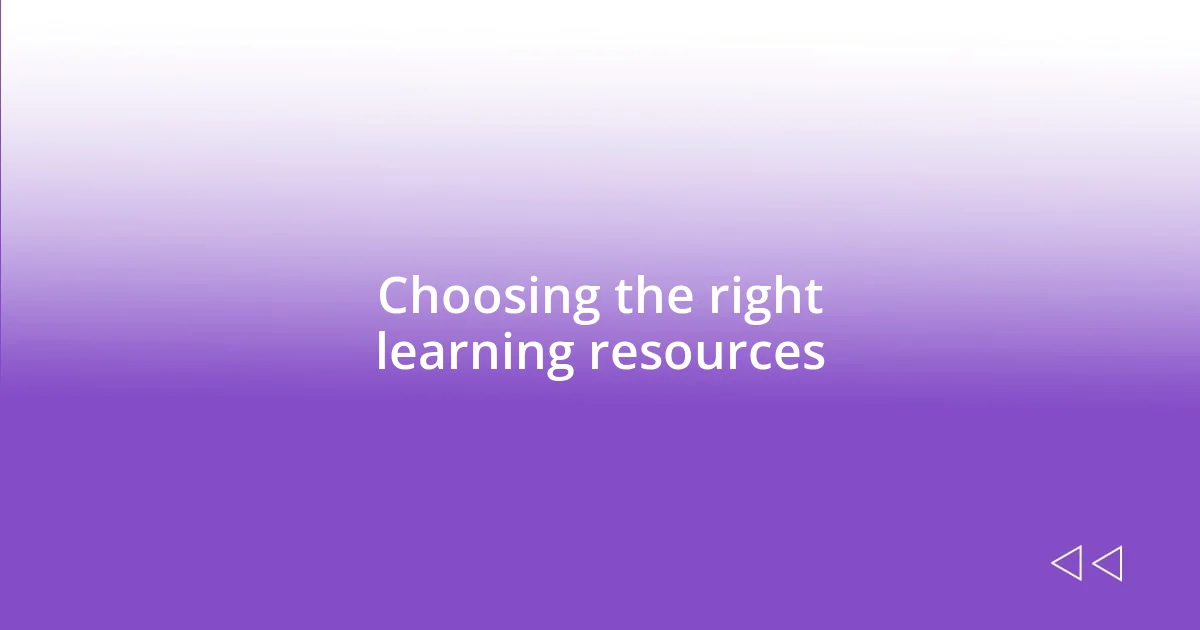
Choosing the right learning resources
Choosing the right learning resources can significantly impact our educational experiences. I vividly remember when I was searching for a solid course on graphic design. I stumbled across countless options, but what truly transformed my learning was finding a resource with engaged instructors and interactive content. That connection made me feel more invested, and I realized that the right platform can inspire and motivate me in ways I never expected.
Here are some key factors to consider when selecting learning resources:
- Quality of Content: Look for resources that are well-researched and presented by credible experts.
- Engagement Level: Choose materials that encourage interaction, such as quizzes or community discussions.
- Accessibility: Ensure that the learning resource is easy to navigate and fits your schedule.
- Reviews and Recommendations: Check feedback from peers to gauge effectiveness.
- Variety of Formats: Opt for resources that offer diverse formats, like videos, articles, and hands-on exercises, to suit different learning styles.
When I decided to delve into coding, I faced the overwhelming task of sifting through countless online platforms. Initially, I tried a highly-rated course that was rigid and dry. I quickly lost interest, which was frustrating. Then, I discovered a more dynamic platform that used gamification to teach programming. This difference revitalized my learning experience and reminded me how crucial it is to find resources that resonate with me personally. After all, education should be engaging and tailored, making it essential to take the time to choose wisely.
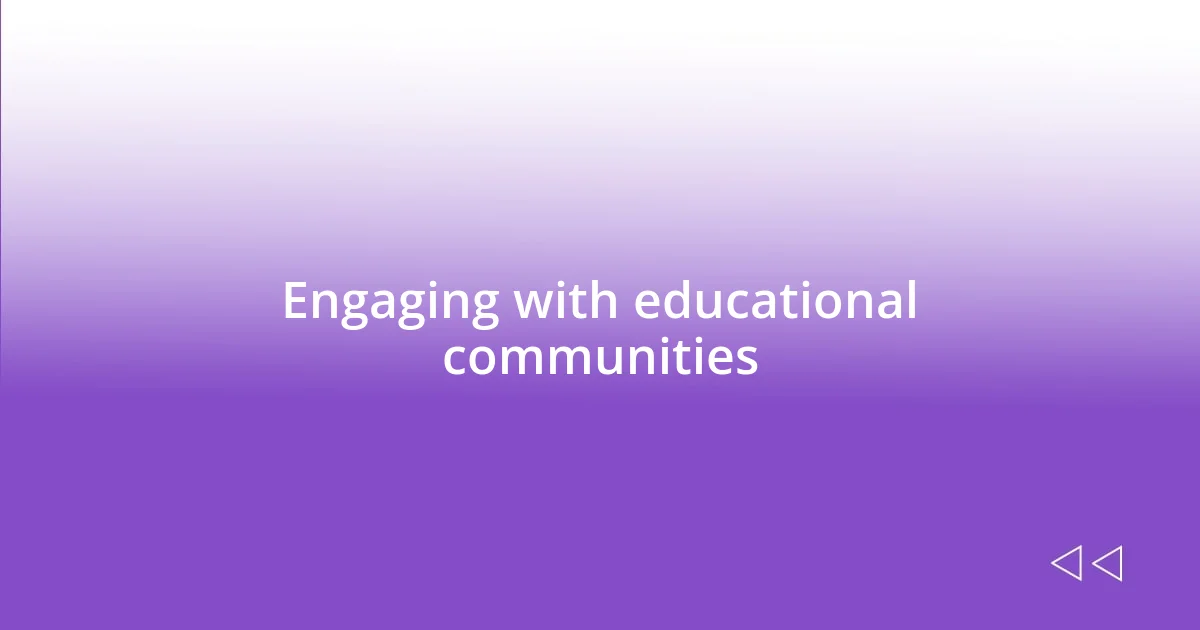
Engaging with educational communities
Engaging with educational communities has profoundly enriched my learning journey. I’ve found that joining forums and groups fosters a sense of belonging, much like a cozy coffee shop where ideas brew and flow. I recall my first experience in a local book club; the simple act of discussing a shared reading not only deepened my understanding but also gave me new perspectives. Can you imagine how much more we can learn when we exchange ideas in a supportive environment?
In my experience, online platforms have opened up a world of educational communities that I never knew existed. Recently, I joined a virtual mastermind group focused on personal development. The lively discussions and shared challenges have driven me to explore concepts I might have otherwise overlooked. I often wonder, what would my learning look like without these vibrant interactions? The collective wisdom of others can often illuminate paths I never considered, transforming challenges into collaborative opportunities.
Moreover, staying connected with these communities has provided a built-in support system. I vividly remember when I was grappling with a complex topic in finance. Posting a question in my group not only provided answers but also sparked a discussion that clarified my thoughts. It made me realize that learning doesn’t have to be a solitary endeavor; instead, it can be a vibrant tapestry of shared knowledge. How often do we undervalue the wisdom that comes from community learning? I am a firm believer that together, we can pave the way for deeper understanding and personal growth.
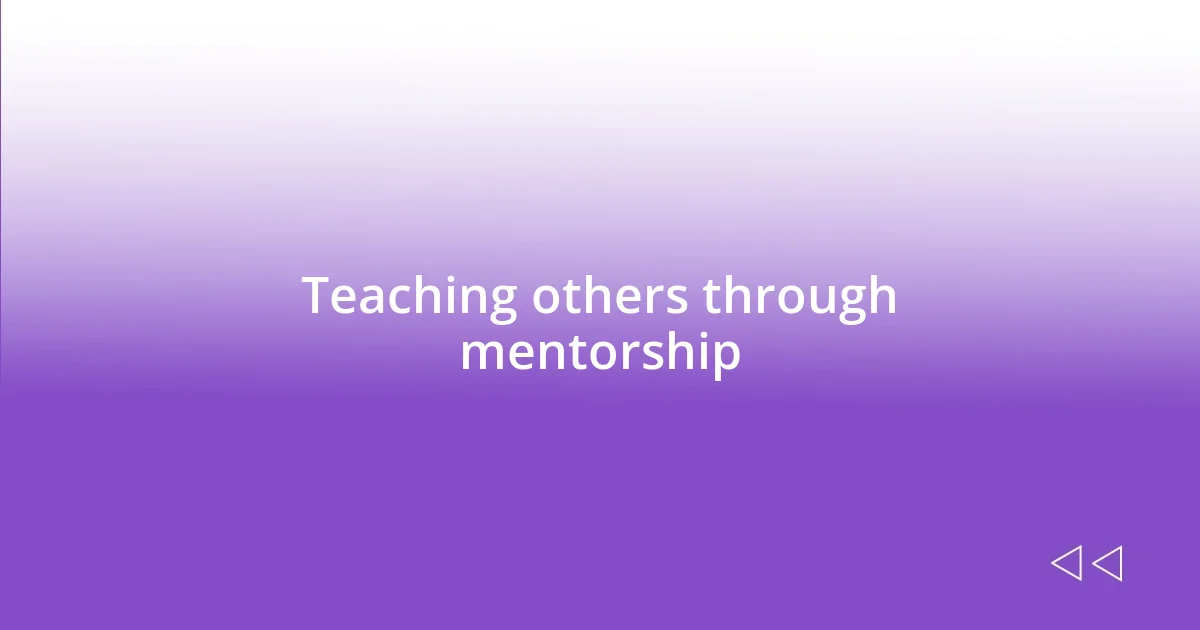
Teaching others through mentorship
Mentorship has always been a cornerstone of my educational journey, and I find immense joy in sharing knowledge with others. I remember the time I took a young intern under my wing during a summer project. Watching her grow from a hesitant newcomer to someone who independently generated ideas filled me with a sense of purpose. It’s incredible how, in guiding others, I found myself learning just as much, if not more, about patience and effective communication.
One aspect of mentorship that I cherish is the opportunity to create a safe space for questions. When I was mentoring a friend on public speaking, he was initially anxious about presenting his ideas. I encouraged him to practice in front of me, which allowed me to share my own struggles with stage fright. Seeing his confidence build through supportive feedback was rewarding. Have you ever experienced that moment when someone truly grasps a concept? It’s like watching a light bulb go off—tangible progress that both mentor and mentee can celebrate together.
Moreover, I firmly believe that mentorship is a two-way street. I recently guided a colleague in learning new software, but what surprised me was the fresh perspective he brought in return. His questions challenged my understanding and prompted me to explore functionalities I had overlooked. Isn’t it fascinating how mentorship can evolve into a collaborative exchange? This symbiotic relationship not only enriches our individual knowledge but also strengthens the connection between us as lifelong learners.
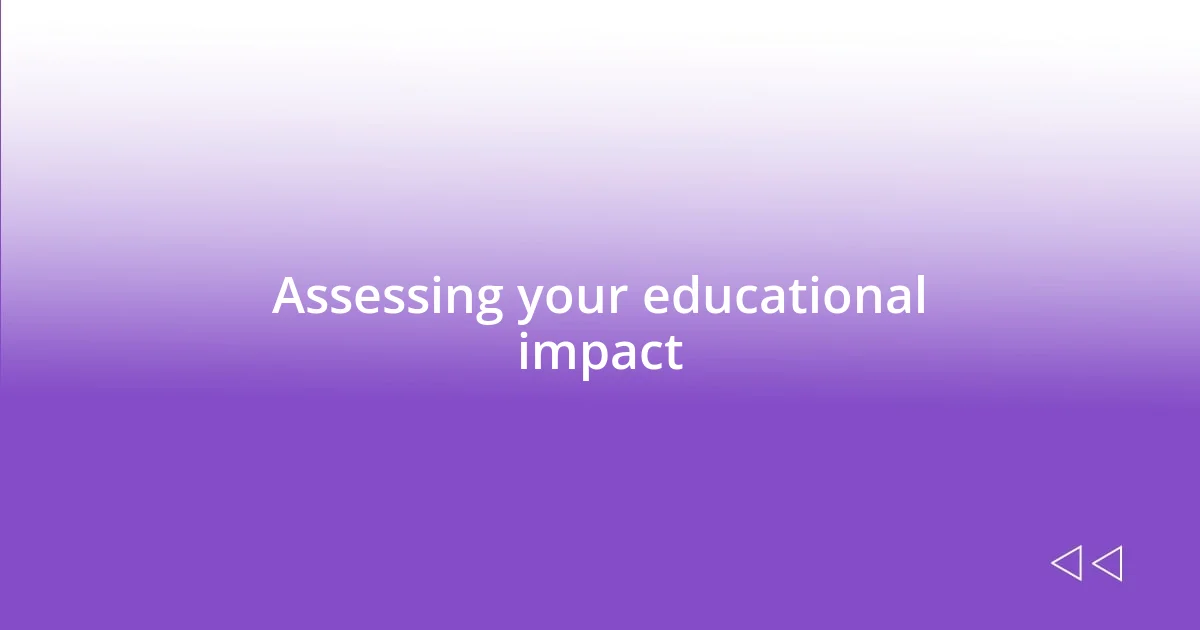
Assessing your educational impact
Assessing my educational impact is an ongoing process that involves reflection and feedback. Recently, I began tracking my involvement in community workshops. After each session, I asked participants for their thoughts on the material presented. Their responses highlighted areas where I could enhance clarity and engagement, giving me invaluable insights. Have you ever sought feedback in such a direct way? It’s a rewarding experience that not only strengthens the learning environment but also solidifies my own understanding.
I’ve also found that measuring the long-term effects of my mentorship is crucial. For example, a mentee I guided through a project recently reached out to share how he implemented our discussions in his new job. Hearing that he felt confident enough to contribute new ideas made my heart swell with pride. This experience reinforced the idea that impact goes beyond momentary interactions; it creates ripples that extend into the future. Don’t you think it’s fascinating how we can inspire others without even being aware of the full extent of our influence?
Additionally, I’ve turned to periodic self-assessment as an educational tool. I created a simple system of journaling my teaching experiences and the outcomes associated with them. Reflecting on my triumphs and missteps has opened my eyes to patterns I hadn’t noticed before. I often ponder how genuine growth stems from this type of reflective practice. Isn’t it amazing how taking the time to assess our impact can lead to more meaningful connections and enhanced learning journeys for both ourselves and those we aim to educate?
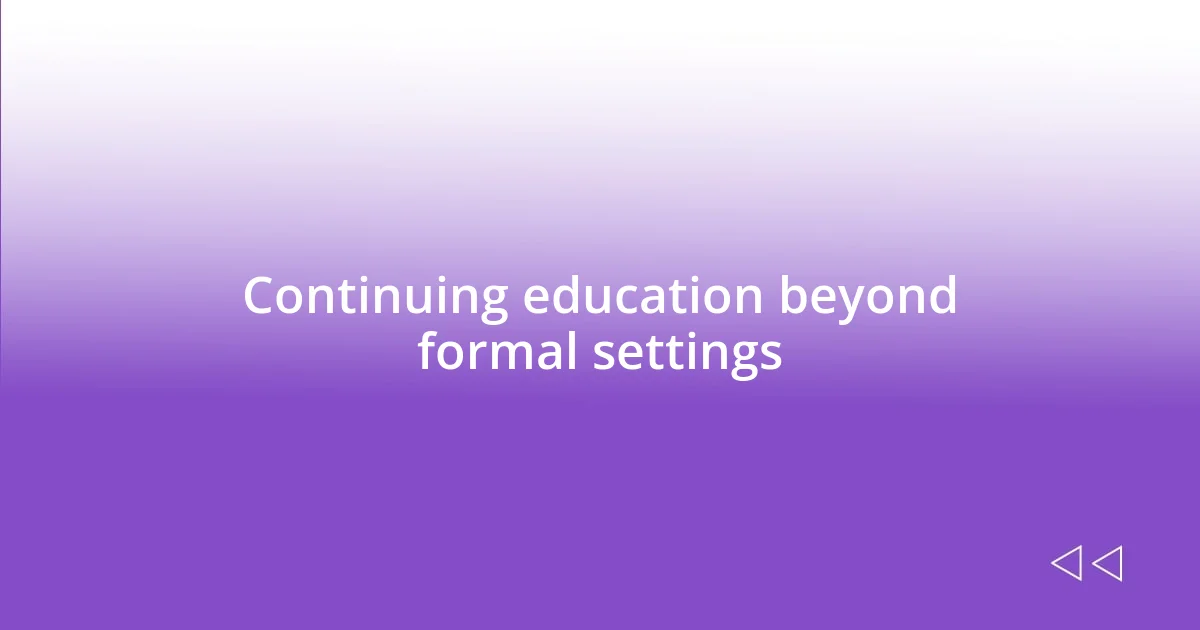
Continuing education beyond formal settings
Continuing education beyond formal settings has been a transformative part of my life. I’ve learned a great deal from online courses and webinars that delve into topics I’m passionate about, like digital marketing. Recently, I enrolled in a course that not only broadened my skill set but also fostered connections with fellow learners who share similar interests. Isn’t it amazing how a single course can open doors to a community of like-minded individuals?
In addition to online resources, I find immense value in attending local meetups. These gatherings often bring together diverse perspectives, which is something I always strive for. At a recent workshop, I met someone who had a completely different approach to problem-solving than I do. Discussing our methodologies sparked an inspiring debate that changed my perspective on a long-standing challenge I’d faced at work. Have you ever had a conversation that flipped your thinking upside down? It’s those moments that truly deepen my understanding and appreciation for varied viewpoints.
Moreover, I actively seek out informal learning opportunities through podcasts and audiobooks on topics I want to explore. Just the other day, while listening to a podcast about leadership, I was captivated by a guest speaker’s personal journey. They talked about their failures and how those missteps became stepping stones for future success. It hit me that learning isn’t always about success; it’s often about navigating through challenges. This realization left me pondering how my own struggles could eventually serve as valuable lessons for others.


